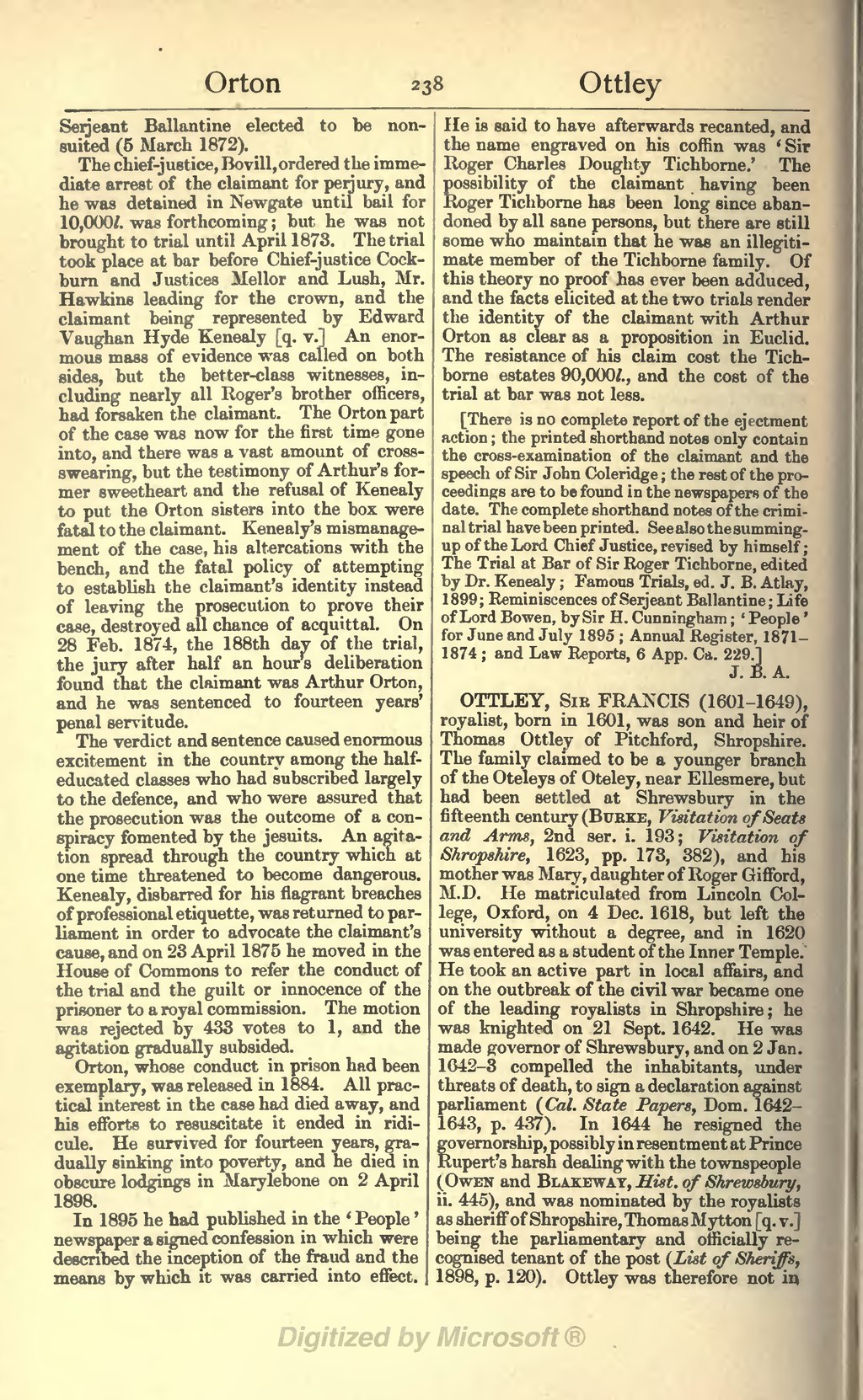Serjeant Ballantine elected to be non-suited (5 March 1872).
The chief-justice, Bovill, ordered the immediate arrest of the claimant for perjury, and he was detained in Newgate until bail for 10,000l. was forthcoming ; but he was not brought to trial until April 1873. The trial took place at bar before Chief-justice Cockburn and Justices Mellor and Lush, Mr. Hawkins leading for the crown, and the claimant being represented by Edward Vaughan Hyde Kenealy [q. v.l An enormous mass of evidence was called on both sides, but the better-class witnesses, including nearly all Roger's brother officers, had forsaken the claimant. The Orton part of the case was now for the first time gone into, and there was a vast amount of cross-swearing, but the testimony of Arthur's for- mer sweetheart and the refusal of Kenealy to put the Orton sisters into the box were fatal to the claimant. Kenealy's mismanagement of the case, his altercations with the bench, and the fatal policy of attempting to establish the claimant's identity instead of leaving the prosecution to prove their case, destroyed all chance of acquittal. On 28 Feb. 1874, the 188th day of the trial, the jury after half an hour's deliberation found that the claimant was Arthur Orton, and he was sentenced to fourteen years' penal servitude.
The verdict and sentence caused enormous excitement in the country among the half-educated classes who had subscribed largely to the defence, and who were assured that the prosecution was the outcome of a conspiracy fomented by the Jesuits. An agitation spread through the country which at one time threatened to become dangerous. Kenealy, disbarred for his flagrant breaches of professional etiquette, was returned to parliament in order to advocate the claimant's cause, and on 23 April 1875 he moved in the House of Commons to refer the conduct of the trial and the guilt or innocence of the prisoner to a royal commission. The motion was rejected by 433 votes to 1, and the agitation gradually subsided.
Orton, whose conduct in prison had been exemplary, was released in 1884. All practical interest in the case had died away, and his efforts to resuscitate it ended in ridicule. He survived for fourteen years, gradually sinking into poverty, and he died in obscure lodgings in Marylebone on 2 April 1898.
In 1895 he had published in the 'People' newspaper a signed confession in which were described the inception of the fraud and the means by which it was carried into effect.
He is said to have afterwards recanted, and the name engraved on his coffin was 'Sir Roger Charles Doughty Tichborne.' The possibility of the claimant having been Roger Tichborne has been long since abandoned by all sane persons, but there are still some who maintain that he was an illegitimate member of the Tichborne family. Of this theory no proof has ever been adduced, and the facts elicited at the two trials render the identity of the claimant with Arthur Orton as clear as a proposition in Euclid. The resistance of his claim cost the Tichborne estates 90,000l., and the cost of the trial at bar was not less.
[There is no complete report of the ejectment action; the printed shorthand notes only contain the cross-examination of the claimant and the speech of Sir John Coleridge; the rest of the proceedings are to be found in the newspapers of the date. The complete shorthand notes of the criminal trial have been printed. See also the summing-up of the Lord Chief Justice, revised by himself; The Trial at Bar of Sir Roger Tichborne, edited by Dr. Kenealy; Famous Trials, ed. J. B. Atlay, 1899; Reminiscences of Serjeant Ballantine; Life of Lord Bowen, by Sir H. Cunningham; 'People' for June and July 1895; Annual Register, 1871-1874; and Law Reports, 6 App. Ca. 229.]
OTTLEY, Sir FRANCIS (1601–1649), royalist, born in 1601, was son and heir of Thomas Ottley of Pitchford, Shropshire. The family claimed to be a younger branch of the Oteleys of Oteley, near Ellesmere, but had been settled at Shrewsbury in the fifteenth century (Burke, Visitation of Seats and Arms, 2nd ser. i. 193; Visitation of Shropshire, 1623, pp. 173, 382), and his mother was Mary, daughter of Roger Gifford, M.D. He matriculated from Lincoln College, Oxford, on 4 Dec. 1618, but left the university without a degree, and in 1620 was entered as a student of the Inner Temple. He took an active part in local affairs, and on the outbreak of the civil war became one of the leading royalists in Shropshire; he was knighted on 21 Sept. 1642. He was made governor of Shrewsbury, and on 2 Jan. 1642-3 compelled the inhabitants, under threats of death, to sign a declaration against parliament (Cal. State Papers, Dom. 1642-1643, p. 437). In 1644 he resigned the governorship, possibly in resentment at Prince Rupert's harsh dealing with the townspeople (Owen and Blakeway, Hist. of Shrewsbury, ii. 445), and was nominated by the royalists as sheriff of Shropshire, Thomas Mytton [q. v.] being the parliamentary and officially recognised tenant of the post (List of Sheriffs, 1898, p. 120). Ottley was therefore not in
